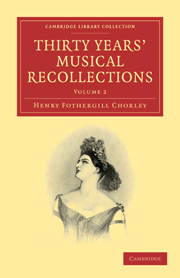Book contents
- Frontmatter
- Contents
- THE YEAR 1847
- THE YEAR 1848 (Her Majesty's Theatre.)
- THE YEAR 1848 (Royal Italian Opera.)
- THE YEAR 1849 (Her Majesty's Theatre.)
- THE YEAR 1849 (Royal Italian Opera.)
- THE YEAR 1850 (Her Majesty's Theatre.)
- THE YEAR 1850 (Royal Italian Opera.)
- THE YEAR 1851 (Her Majesty's Theatre.)
- THE YEAR 1851 (Royal Italian Opera.)
- THE YEAR 1852 (Her Majesty's Theatre.)
- THE YEAR 1852 (Royal Italian Opera.)
- THE YEAR 1853 (Royal Italian Opera.)
- THE YEAR 1854 (Royal Italian Opera)
- THE YEAR 1855 (Royal Italian Opera.)
- THE YEAR 1856 (Her Majesty's Theatre.)
- THE YEAR 1856 (Royal Italian Opera.)
- THE YEAR 1857 (Royal Italian Opera.)
- THE YEAR 1857 (Her Majesty's Theatre.)
- THE YEAR 1858 (Her Majesty's Theatre.—Royal Italian Opera.—Drury Lane.)
- THE YEAR 1859 (Royal Italian Opera.—Drury Lane.)
- The Last Chapter
THE YEAR 1851 (Her Majesty's Theatre.)
Published online by Cambridge University Press: 29 August 2010
- Frontmatter
- Contents
- THE YEAR 1847
- THE YEAR 1848 (Her Majesty's Theatre.)
- THE YEAR 1848 (Royal Italian Opera.)
- THE YEAR 1849 (Her Majesty's Theatre.)
- THE YEAR 1849 (Royal Italian Opera.)
- THE YEAR 1850 (Her Majesty's Theatre.)
- THE YEAR 1850 (Royal Italian Opera.)
- THE YEAR 1851 (Her Majesty's Theatre.)
- THE YEAR 1851 (Royal Italian Opera.)
- THE YEAR 1852 (Her Majesty's Theatre.)
- THE YEAR 1852 (Royal Italian Opera.)
- THE YEAR 1853 (Royal Italian Opera.)
- THE YEAR 1854 (Royal Italian Opera)
- THE YEAR 1855 (Royal Italian Opera.)
- THE YEAR 1856 (Her Majesty's Theatre.)
- THE YEAR 1856 (Royal Italian Opera.)
- THE YEAR 1857 (Royal Italian Opera.)
- THE YEAR 1857 (Her Majesty's Theatre.)
- THE YEAR 1858 (Her Majesty's Theatre.—Royal Italian Opera.—Drury Lane.)
- THE YEAR 1859 (Royal Italian Opera.—Drury Lane.)
- The Last Chapter
Summary
How little of Italy there was in Her Majesty's Theatre during the Great Exhibition year 1851, the foregoing list curiously shows. There was no stint of enterprise;—however much miscalculation.—Generally speaking, the music was more accurately prepared than it had been for some seasons past.
The attempt to enrich the Italian repertory by M. Auber's grand operas has only succeeded in the case of “La Muette.” Strictly speaking, that bright Neapolitan story hardly comes within the designation, so few of the great musical pieces are developed. There is a much closer attempt at the style in “Gustave” and “L'Enfant Prodigue,” and therefore they are less successful,—the composer always suffering when serious music on a grand scale is to be attempted. A great building of alabaster would have a poor appearance, in nowise suggesting the preciousness of the material. Yet, “Gustave” is full of delicious music finely wrought, beginning with the first notes of the overture, which has a fascination approaching those which open Signor Rossini's opera-preludes. I was never fully aware of the value of this music till I was, in the year 1861, hearing the assault made by Signor Verdi on the same story. It seems strange to those who know a certain affectation to be one characteristic of French Opera composers, that the Italian should be the less natural of the two,—but such is the case.
The version of “L'Enfant Prodigue” pleased less, and deservedly so, in spite of the admirable singing of Madame Sontag, who did wonders with the weak music of her part.
- Type
- Chapter
- Information
- Thirty Years' Musical Recollections , pp. 132 - 143Publisher: Cambridge University PressPrint publication year: 2009First published in: 1862

